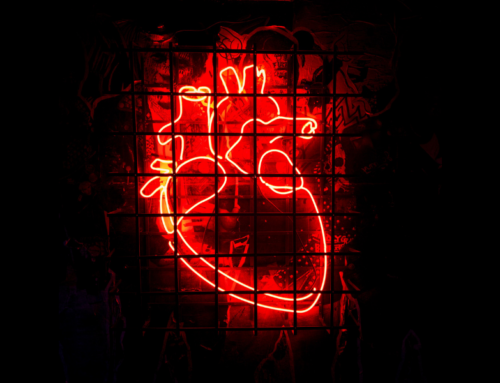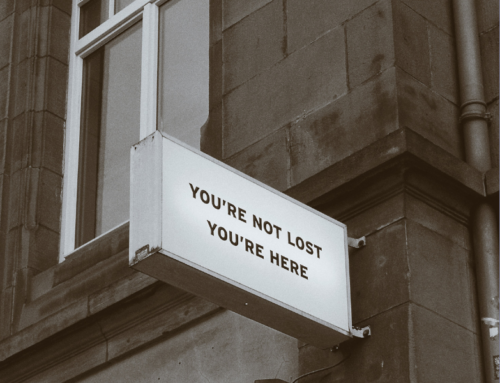Good mental health involves feeling a wide and changeable range of emotions. This includes deep sadness, rage, regret and other spiky feelings. Feeling these feelings does not mean you have poor or unstable mental health.
what is the difference between ‘this is making me feel sad’ and ‘this is affecting my mental health’?
Let’s say a situation is sad, and you feel sad, and you’re aware of it and you’re expressing that sadness – perhaps through crying, talking, writing, or some other safe outlet. It is sair tae bear, to use the old Scot’s phrase, but you are not frozen or disconnected. Your mind and body are processing what’s going on. That’s healthy. You might seek more support if it’s a lot. That’s also healthy.
But what if if a situation is sad, and you don’t feel sad, or you’re not aware of feeling sad? That could mean it’s too much and you’ve had to disconnect from it. Or what if it’s stressful, and the stress is building up, and you have no way to bring the stress levels back down? What if your feelings are leaking out, changing your mood or behaviour, but you’re not able to express them in a straightforward way and so you feel no relief? That is really debilitating. Not being able to express our emotions takes a big toll, and tends to cause mental health problems in the long run.
how do people avoid expressing emotions?
Sometimes it is conscious. There are many situations where we believe we should not express how we feel, and we deliberately push the feeling down.
It is also an unconscious thing. Many people numb difficult feelings using substances like alcohol, or pack every moment with distractions so there is no time for them to come up, or live ‘in their heads’, focusing on thoughts instead of being aware of bodily sensations. The human mind is really good at that. It’s kind of amazing that we can hide things from ourselves, and it allows us to survive awful situations, but there are consequences…
what happens to your mental health when you don’t express emotions?
The mind can push emotions aside for a while, but can’t make them disappear – that’s not how emotions work. An emotion is an automatic reaction by the nervous system; it’s not something you can control. Trying to keep emotions down and hidden from others puts a huge strain on your nervous system, which keeps sending increasingly desperate signals. This can lead you to taking increasingly desperate measures to try to keep things under control.
Emotions are meant to prompt an action. If we don’t do anything with them, the nervous system is left with unfinished business. When this happens repeatedly, or with very big feelings, it has all sorts of knock-on effects on how your mind and body work – ie. on your mental health (and physical health as well).
Maybe it would help to think of it as taking off a long-worn suit of emotional armour, which, as much as it might appear to protect us and make us look strong, can ultimately leave us feeling weighed down, unseen and disconnected from those around us (from Time to Talk, by Alex Holmes)
why do people avoid expressing emotions?
How did we get so far from doing something so natural? For many people, it does start in childhood. If it wasn’t safe to express your feelings in your early years, if the adults weren’t able to show you how to do this in a safe way, you’ve got the feelings, but you don’t know what to do with them.
Also, it’s very common – very human – to want to avoid difficult, painful things. It seems to make sense: why would you want to go there? The problem is, trying to avoid painful emotions limits our ability to connect with others and ourselves, to live life to the fullest, and sometimes, at worst, to live at all. And the longer we keep the lid on them, the scarier it gets to let them out.
Making matters much worse, our culture has made a real feature of ignoring and disconnecting from emotions – with all sorts of confusing and dangerous results. We now have endless distractions from our feelings, and very few safe outlets for our feelings that are available to all. This has left us lacking in vital skills, struggling alone, and fearful of what is going on in ourselves and others.
When we know that our emotions are meant to be experienced and that they’re not something that we need to run from, it makes it easier to move into a place of optimism because we know that we can handle whatever comes our way (from Toxic Positivity, by Whitney Goodman)
what can you do about it?
So you can’t bypass your emotions – not forever. You can become more skilful at expressing emotions in a way that makes you more connected with yourself and others. And just to be absolutely clear: emotions are a human thing, not a gender thing. Men are not ‘less emotional’ – you may have been restricted in expressing your emotions, but the good/bad news is you are just as human as everyone else.
Here are three keys to developing your emotional expression
(three ’S’s if you ignore the spelling!)
- Psychoeducation
It really helps to learn a bit about how the nervous system works and what affects it. Books and social media are good for this (take care who you listen to, of course, and take all advice on a trial basis). - Safety
People need some sense of safety to be able to express emotions. You might be able to create this for yourself, or get it from a healthy relationship (whether romantic, friendship or fellowship). - Stability
Stability is not the same as being flat or static. Even buildings and bridges need to flex to deal with pressure. Mental stability is about being able to return to your centre point, no matter how far you swing out from it. You might be able to identify things that always ‘bring you back’ – things that make you feel steady and present and calm. When you are confident about being able to to come back, you will be more confident to let go.
if you’re struggling
If you are struggling with any of these things, therapy can help – it can provide all three. But also, remember it’s not necessarily a bad sign if you’re feeling more difficult and painful feelings. That could be a sign of your mental health getting better, not worse – or at least of being ready to deal with the stuff that’s been too much to face until now. You’re getting more connected and more emotionally agile.
You don’t need to worry about the size of the feelings, more about the stickiness. If an emotion sticks for too long it starts to cause problems – and a therapist can help you get you unstuck if needed.
Below are some relevant books with more on this topic, and please get in touch if you think we can help.
~ Kate MacDougall, centre co-ordinator and bibliotherapist
header image photo by Pavel Danilyuk on Pexels
All book links take you to our pages on Bookshop – the platform for independent bookshops.
We are a social enterprise. Buying books from these links supports our centre and services, so your book contributes to your wellbeing (we hope) and to others’ too.
Please email info@thenextchapter.org if you have any questions about the books or would like to get some personalised recommendations.







